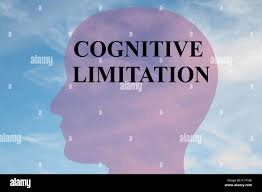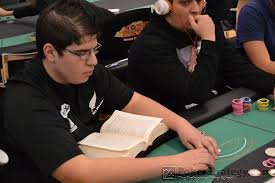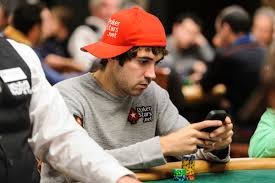Home » Multitasking In Poker – Is It Possible
MULTITASKING IN POKER
IS IT POSSIBLE?
Multitasking in poker is often seen as a badge of honor, with many players believing they can juggle multiple tasks while maintaining peak performance at the table. But is it truly possible to balance distractions like social media, emails, and conversations with the intense focus poker demands? This article explores the science behind multitasking, highlighting how it affects cognitive resources, decision-making, and overall poker performance. Understanding the impact of multitasking is essential for any player aiming to refine their strategy and gain an edge over their opponents. Let’s delve into whether multitasking in poker is a myth or a manageable reality.
THE MYTH OF MULTITASKING
Multitasking in poker is often misunderstood. While many believe they can perform several tasks at once, cognitive research reveals that multitasking is actually rapid task-switching. Each time you shift focus, your brain uses valuable cognitive resources, leading to fatigue and errors. In poker, this constant shift between distractions and gameplay reduces your ability to analyze hands, observe opponents, and make optimal decisions.

Research from the National Library of Medicine by Dr. Irving Koch, Dr. Andrea Kiesel, Hermann Muller, and Dr. Leif Johannsen demonstrates that even combining a cognitive task with a movement task, such as walking and talking on the phone, leads to performance inadequacies. Individuals are more prone to tripping, walking in the wrong direction, or missing their destination. This highlights that multitasking inherently compromises performance, making it clear that in high-stakes games like poker, undivided attention is crucial.
Recent studies in cognitive psychology emphasize that true multitasking is a myth, highlighting that even brief distractions can significantly impact performance. For poker players, the message is clear: minimizing distractions and focusing on one task at a time is essential for success at the table.
COGNITIVE RESOURCE LIMITATIONS
Cognitive resources are the mental capabilities that allow us to process information, make decisions, and interact with our surroundings. In poker, these resources are constantly taxed by the need to calculate odds, hand probabilities, hand ranges, read opponents, and adjust strategies. Attempting to multitask depletes these resources faster, leaving players more prone to errors.
Renowned neurologist Richard Cytowic compares multitasking to a computer processor dividing time between tasks, leading to inefficiency and slowdown. Similarly, our brains cannot perform multiple cognitive tasks simultaneously without sacrificing quality. Cal Newport, a computer science professor, emphasizes that even brief task-switching, like checking an email, initiates cognitive changes that disrupt focus, calling it “productivity poison.” Stanford’s Clifford Nass found that heavy multitaskers struggle with filtering irrelevant information, organizing thoughts, and switching between tasks effectively.
Key cognitive resources include:
ATTENTION
MEMORY
PERCEPTION
Essential for focusing on the game, observing opponents, and avoiding distractions.
Crucial for recalling past hands, player tendencies, and game dynamics.
Helps interpret physical tells and betting patterns.
PROBLEM-SOLVING ABILITIES
THINKING SPEED
Allows players to develop and adjust strategies in real-time.
Necessary for quick decisions under time pressure.
When these resources are divided between poker and other tasks, performance suffers. Studies show that multitasking impairs memory retention and slows down reaction times. For poker players, managing cognitive load by dedicating full attention to the game ensures sharper decision-making and better long-term results.
.
TASK SWITCHING & ITS IMPACT ON POKER
Switching task, often mistaken for multitasking, refers to the mental process of shifting focus from one task to another. In poker, switching attention between the game and external distractions like social media or conversations depletes cognitive resources and affects decision-making quality.
Research shows that it takes an average of 23 minutes and 15 seconds to regain full focus after switching tasks, and it increases your potential error rate by up to 50%, according to a study by Gloria Mark at the University of California, Irvine. This delay disrupts the cognitive flow, leading to fragmented attention and impaired comprehension.
In poker, even brief task switching can cause players to miss critical information such as betting patterns, player tendencies, or changes in table dynamics. The cognitive effort required to refocus can reduce the quality of decisions, increasing the risk of costly mistakes. Additionally, task switching impacts both tasks negatively, lowering efficiency and accuracy in each. For poker players, minimizing task switching is essential to maintain high-level performance and ensure that every decision is based on complete and accurate information.


RISKS ASSOCIATED WITH MULTITASKING IN POKER
Multitasking in poker not only affects focus but also introduces numerous risks that can hinder performance and long-term success. Here’s how the negative impacts of multitasking translate to the poker table:
INCREASED MENTAL FATIGUE
HIGHER ERROR RATES
INEFFICIENT BRAIN FUNCTION
INCREASED STRESS LEVELS
Constant task-switching depletes cognitive energy, leading to quicker mental exhaustion. In poker, this results in reduced concentration during long sessions, causing players to potentially misunderstand information like opponents’ tells or changes in betting patterns.
Studies show that high multitaskers are more prone to making errors. In poker, this can mean misreading a hand, making incorrect calculations, or failing to notice a crucial bet size.
Multitaskers often recruit more of their brain to complete tasks, making their mental processes less efficient. Poker players relying on divided attention may find themselves struggling to analyze complex hand scenarios accurately.
Multitasking raises stress, blood pressure, and heart rate—factors detrimental to clear thinking. Poker requires calm and rational decision-making, and heightened stress can lead to impulsive plays and poor judgment.
MEMORY DISTRUPTIONS
DECREASED CREATIVITY & pROBLEM sOLVING
CHRONIC STRESS & MENTAL HEALTH RISKS
Dividing attention between poker and other tasks can lead to short-term memory disruptions, causing players to forget critical details like prior betting actions, player tendencies, or pot sizes.
Multitasking drains mental energy, reducing a player’s ability to think creatively, adapt strategies, and analyze opponents effectively.
Over time, multitasking in poker can lead to chronic stress, impacting mental health and self-confidence. Players may experience increased anxiety, frustration, and even depression due to subpar performance and frequent mistakes.
To maintain peak performance, poker players must recognize these risks and strive to minimize distractions, ensuring that all cognitive resources are dedicated to making optimal decisions at the table.
CASE STUDIES & STATISTICAL DATA
Empirical studies consistently highlight the detrimental effects of multitasking, providing compelling evidence for why poker players should avoid it.
AMERICAN PSYCHOLOGICAL ASSOCIATION
JOURNAL OF EXPERIMENTAL PSYCHOLOGY
Reports that task switching can lead to a 40% drop in productivity, meaning poker players who multitask are likely compromising their performance significantly.
Found that multitasking can double the time needed to complete tasks, which in poker could mean delayed decision-making and missed betting opportunities.
STANFORD UNIVERSITY RESEARCH
UNIVERSITY OF UTAH STUDY
POKER-SPECIFIC STATISTICS
Heavy multitaskers were shown to perform poorly due to their inability to filter irrelevant information and maintain organized thoughts, a critical disadvantage at the poker table where focus is paramount.
Revealed that only 2.5% of people can multitask effectively. For the vast majority of poker players, attempting to multitask increases the likelihood of mistakes and reduces the quality of play.
According to BlackRain79, 70% of poker players report decreased performance when multitasking, and multitasking during games can lead to a 60% increase in mistakes.
These studies underscore the importance of focused play. The data clearly shows that multitasking reduces cognitive efficiency, increases errors, and hampers performance, making it essential for poker players to eliminate distractions and maintain full concentration during play.
STRATEGIES TO AVOID MULTITASKING IN POKER
To maximize focus and enhance performance, poker players must implement strategies that minimize distractions and prevent multitasking. Here are effective methods to achieve this:
CREATE A DISTRACTION-FREE ENVIRONMENT
SET SPECIFIC POKER GOALS
PRACTICE MINDFULNESS TECHNIQUES
If you are playing online, turn off notifications on your phone, close unnecessary browser tabs, and eliminate background noise to maintain full concentration.
Establish clear objectives for each session, such as observing player tendencies or improving hand range analysis, to keep your mind engaged.
Techniques like deep breathing and meditation can help players stay present and avoid the urge to multitask.
LIMIT EXTERNAL ACTIVITIES
USE TIME MANAGEMENT TOOLS
REVIEW AND REFLECT POST-SESSION
Avoid engaging in other activities, such as watching TV or texting, during poker sessions to ensure that all cognitive resources are dedicated to the game.
Allocate specific times for breaks and non-poker tasks to reduce the temptation to multitask while playing.
Analyze your gameplay after each session to identify moments when distractions affected your performance and develop strategies to avoid them in the future.
By incorporating these strategies, poker players can maintain sharper focus, make better decisions, and improve their overall results by avoiding the pitfalls of multitasking.
Multitasking in poker is more myth than reality, with substantial evidence showing that dividing attention compromises cognitive resources, increases errors, and reduces performance. From understanding the cognitive demands of poker to recognizing the risks of multitasking, players must prioritize focus and eliminate distractions to succeed.
The statistics and case studies presented highlight that multitasking leads to mental fatigue, poor decision-making, and decreased efficiency. Implementing strategies to avoid multitasking ensures that players remain sharp, responsive, and strategic at the table. In a game where every decision matters, single-tasking is not just beneficial—it is essential for long-term success. Poker players who dedicate their full attention to the game will always have an edge over those who attempt to juggle multiple tasks.
